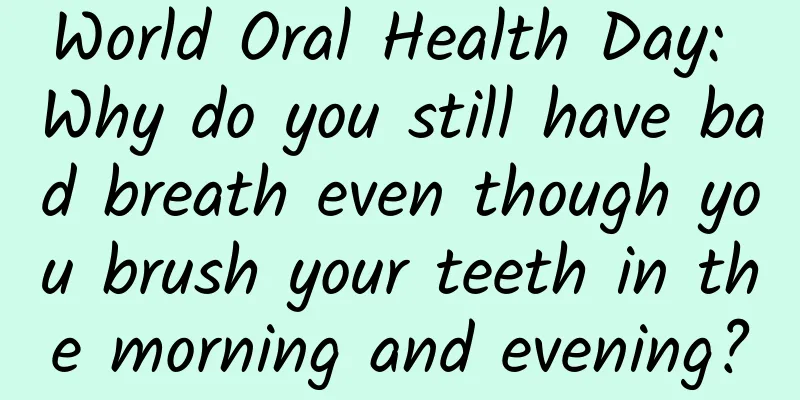World Oral Health Day: Why do you still have bad breath even though you brush your teeth in the morning and evening?

|
Fresh breath is a healthy oral condition that modern people pursue. In the past, people used toothpaste and brushing to eliminate bad breath. Today, chewing gum, mouthwash, breath fresheners, and other oral products are emerging in an endless stream. But we still find that even if we brush our teeth every morning and evening, we still have bad breath in our mouths. Why is this? To understand this problem, we need to first understand how bad breath is produced. Oral odor, also known as halitosis, has a complex etiology. The most common types are physiological halitosis and pathological halitosis. Physiological halitosis is often caused by the reduction of the self-cleansing function of saliva, such as the reduction of saliva secretion at night when sleeping. This type of halitosis is characterized by short duration and does not require special treatment. Pathological halitosis includes two sources: oral and systemic. Oral sources are mainly caused by oral diseases such as periodontal disease, while systemic sources are mainly related to some non-oral diseases such as the respiratory tract, digestive tract, and endocrine system. It is currently believed that the bacteria in the mouth are the root cause of all oral halitosis, which is caused by the metabolism of food residues, desquamated epithelial cells, blood, gingival sulcus fluid, plaque, etc. by microorganisms in the mouth. The large number of bacteria colonized on the surface of the tongue is the main cause of physiological halitosis, which explains why brushing teeth alone cannot effectively remove halitosis. It is necessary to clean the tongue while cleaning the mouth every day to achieve the effect of effectively removing halitosis. Patients with periodontal disease need to go to a dental hospital for periodontal treatment. Patients with systemic diseases that cause bad breath need to receive systemic disease-related treatment. Only by solving the source of bad breath can the bad breath problem be completely eliminated. So, can oral products such as mouthwash eliminate bad breath? And can we use them for a long time? Mouthwashes without active ingredients usually cover up bad breath through the taste of the mouthwash itself, but do not really remove bad breath, and the effect is short-lived. Some mouthwashes containing antibacterial ingredients may cause side effects such as disturbance of normal oral flora, taste changes, and coloration if used for a long time, so they need to be used under the guidance of a doctor. To maintain fresh breath, you need to choose a method that suits you according to your oral health. For people with physiological halitosis, they need to clean their tongue every day on top of regular oral hygiene. For patients with periodontal disease or related systemic diseases, they need to go to a medical institution for treatment of the disease on top of regular oral hygiene and cleaning their tongue. Long-term use of mouthwash containing active ingredients should be used under the guidance of a doctor. Author: Liu Xuenan, Director of the Oral Medical Division of the Chinese Stomatological Association and Associate Researcher at Peking University School of Stomatology Review | Si Yan, a researcher at the Chinese Stomatological Association and chief physician at Peking University School of Stomatology |
Recommend
Female menopause age range
Menopause is a stage that all women have to go th...
What are the benefits of eating sauerkraut for women
Have you ever eaten kimchi? Generally, northerner...
What is the reason for the rapid decline in vision? What should I do if my vision suddenly decreases a lot?
Vision is really important, especially for people...
My cervix sometimes hurts
In the face of the problem of occasional uterine ...
Treatment of trichomoniasis in women
There are many common diseases among women. When ...
If you have abdominal pain and bloody stool, beware of acute intestinal necrosis!
Author: Tang Qin, Deputy Secretary-General of the...
Which is more accurate, a test strip or a pregnancy test stick?
Modern medical equipment is very scientific and a...
6 months pregnant with blood in vaginal discharge
Although women will experience amenorrhea during ...
The most obvious signs of pregnancy on day 3
Although pregnancy will cause women's body sh...
Is a blood test for pregnancy accurate?
Drawing blood to test whether you are pregnant is...
Causes and treatment of rhinitis during pregnancy
Pregnancy is something every woman will experienc...
Average number of months to get pregnant
It is not possible to generalize how many months ...
When will menstruation come after giving birth?
Many mothers are more concerned about when their ...
Clinical manifestations of breast nodules
I believe everyone knows the importance of breast...
What does it mean that the new coronavirus has mutated? The impact of the new coronavirus mutation
The Chinese research team found that the new coro...









